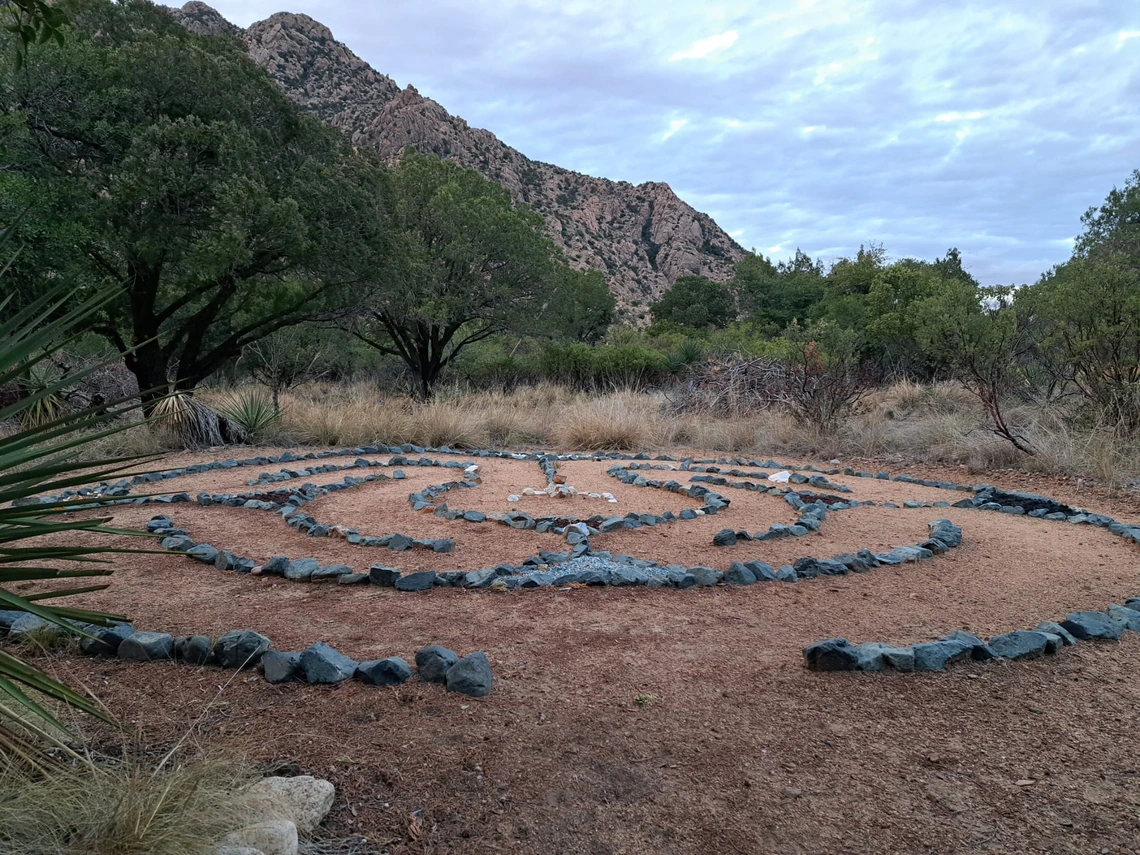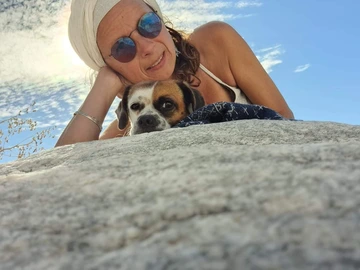Rethinking human rights (education): Spirituality, well-being and social change

Stone labyrinth at Dragoon Mountain, Arizona
During the 2023-24 academic year, Dr. Ivana Radačić was a Visiting Fulbright Scholar at the University of Arizona, collaborating in particular with the Human Rights Practice Program. Dr Radačić is a human rights academic and activist based in Zagreb, Croatia, and was recently the Vice-Chair of the UN Working Group on discrimination against women and girls. She is a research advisor at Ivo Pilar Institute of Social Sciences in Zagreb and a part-time lecturer at the University of Osijek. In spring 2024, Dr Radačić taught a course entitled "Self- and collective- care, well-being and spirituality: A holistic human rights framework" and in this blogpost reflects on the journey that she and the students in the course in exploring holistic approaches to human rights. At the end of this article there are links to the policy proposals written by students in the course.
by Dr. Ivana Radačić
According to Indigenous prophecies, we are living in the time of the dance of the Cannibal Giant and are currently at the two-fork road: either we are heading towards extinction or towards a new age. At such times, it is important to question the efficiency of the global governance system of human rights, and the role of human rights education in contributing to social change.
Dominant human rights framework, based on separation thesis, embraces a set of dichotomies which, inter alia, divorces spirituality and healing from social justice, individual from the community (including non-human). As such, it is foreign to Indigenous peoples who see all life as inter-related. This view of human rights enforces a conflict-based paradigm of human rights practice, which contributes to infighting in the human rights movement. This, together with the culture of martyrdom, exacerbates the already difficult task of dealing with human suffering and leads to a high prevalence of trauma, burnout, depression and other mental health issues in the field.
While long neglected, the well-being of human rights activists has now become a part of a research agenda, and human rights collectives have started adopting different self-care and collective-care policies and practices. However, well-being and spirituality have not yet featured as important topics and practices in human rights education, even though many students are (or will become) human rights activists who are (or will be) facing these issues. Moreover, human rights education can also be physically, emotionally, mentally and spiritually challenging, as students learn about immense human suffering. Incorporating care as a topic and practice in human rights education hence seems to be important.
However, most human rights education programs have been uncritical of the dominant Eurocentric narratives and are overly legalistic. They have neglected the topics of spirituality and well-being. Survey of human rights programs in the USA searchable online showed that none of these engaged with these topics in the courses they offered. Even the field of critical human rights education – a set of approaches that critiques the colonial and neoliberal discourses and declarationist approaches to human rights education -- has not paid attention to the links between healing and social justice.
To address this gap and support social change through education, I have designed and taught a (fully online) master's-level course Self- and collective-care, well-being and spirituality: Holistic human rights framework, as a part of the University of Arizona Human Rights Practice Program, from January to March 2024. The aim was to provide a possible roadmap for a new path in (critical) human rights education as a part of my dreaming the new world into being.
Over the course of 7.5 week, we engaged with the following topics: critique of human rights framework and the role of spirituality in human rights field; mental health implications of human rights work; well-being of human rights defenders; promising self- and collective-care practices; role of eroticism, joy and pleasure in human rights activism; and indigenous approaches to social justice.

Ivana Radačić in Finger Rock, AZ with her canine companion Pia
In addition to engaging with the lessons and readings, the students were encouraged to reflect on their own personal experiences in relation to the issues studied. Moreover, we had informal meetings once a week, not only to discuss what we were studying, but also to engage in different self- and collective-care practices, including talking circles, meditation, and dance. As one student reflected on these meetings, they provided a space for building community and connecting to one another.
At some of these meetings, we also had guest lecturers, including Indigenous leaders Sherri Mitchell and Mona Polacca. In addition to reflections on the readings, assignments included sharing self-care practices. The videos students made featured the following practices: meditation, gardening, deconstructing thought processes, tarot and oracle readings, nature wandering, painting rocks, writing, sawing. Students also developed well-being policies for human rights collectives. In this blogpost series we introduce these group projects (see below for links).
While students took different approaches in developing and writing the well-being policies, in terms of content and style, some common themes can be found in all of them. For example, they all found it important that there is a dedicated physical space for well-being practices in organizations, and that organizations promote and institute practices of collective care and community building, such as retreats, workshops, regular check-ups, meditations and discussions. Moreover, they found it important that employees have access to psycho-social and other support systems and have proposed various work benefits. They also emphasized the importance of setting boundaries in terms of work demands, regulating working hours and ensuring that employees have enough break and leave time, as well as ensuring that they are well paid. Some groups proposed limiting the working time to four days a week while one group proposed a flexible, project-oriented (rather than hours-oriented) approach to managing working schedules.
These proposals signify a shift from productivity to wellness, individualistic top-down work culture to a more communal co-lead one. One group in particular has focused on building a communal, co-developed organizational culture, while another group has emphasized the importance for organizations to know their souls and develop and sign the soul song to carry them through difficult times.
The idea behind these policies was to plant a seed for new healthier organizations to sprout in the human rights field, as all students emphasized the urgency of addressing the burnout and trauma in the field. Doing this exercise has helped students think about what organizations they want to be a part of. As one of the students said in her reflection on the course: “By learning about collective care, I feel empowered to seek out and turn down opportunities that do not show alignment with my values associated with self-care and collective care.” Similarly, another one said: “I now have the tools I need to evaluate whether an organization prioritizes well-being of its employees … and if it is an environment where I can thrive”. With this blogpost series, we hope to inspire others to find and build environments where they and other people can thrive.

